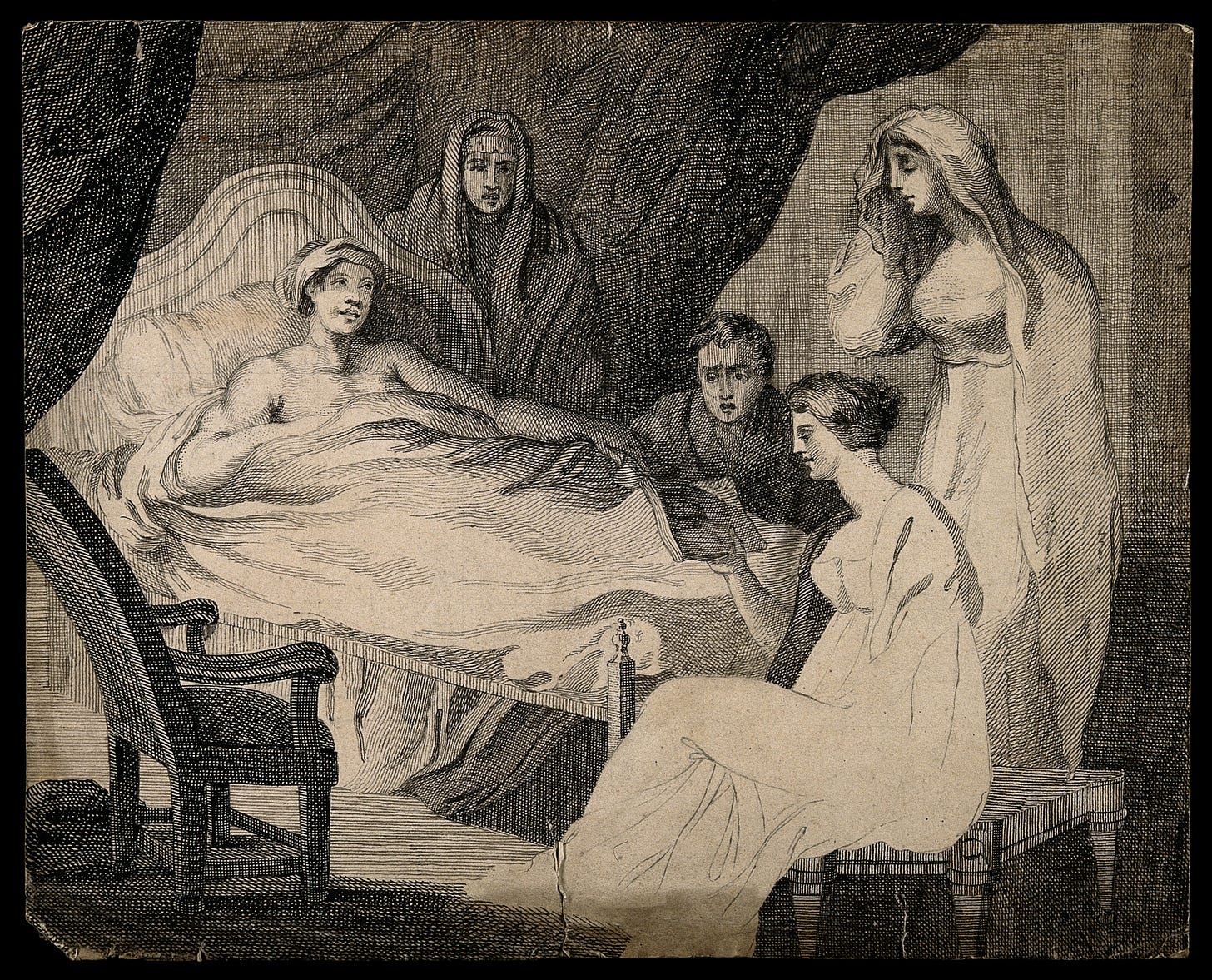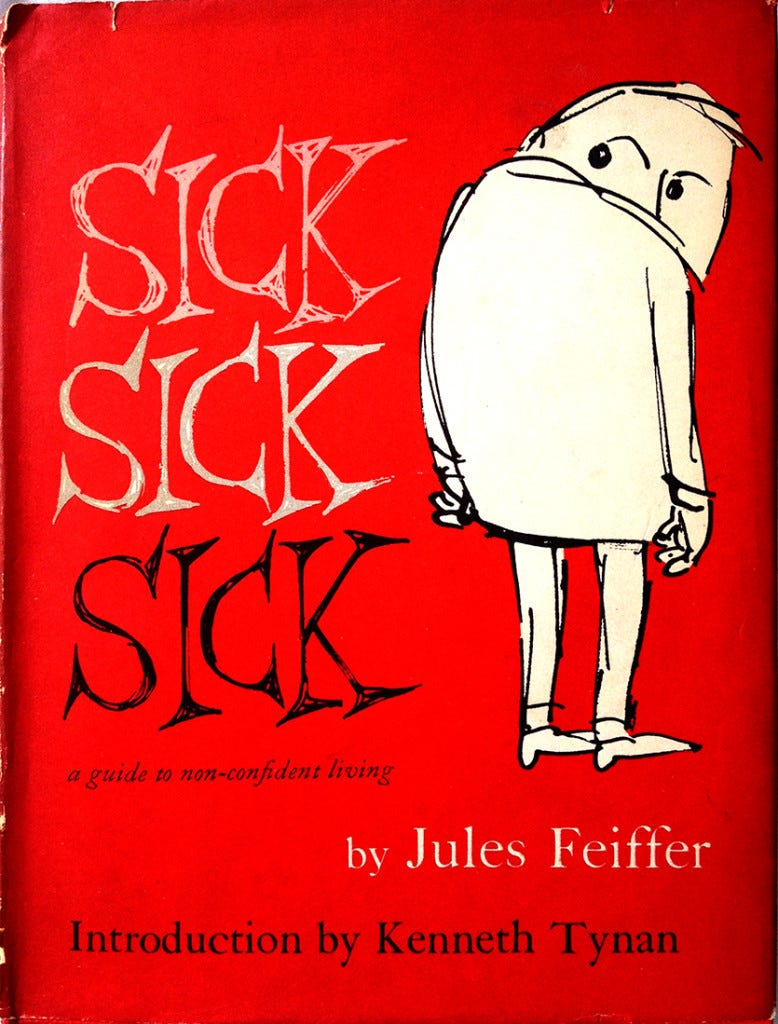I am a person of above-average health: no chronic illnesses, good teeth, low blood pressure, zero medications.1 I’ve never had Covid, and until recently I hadn’t had so much as a head cold in more than two years. So it was annoying to wake up a few days ago with a painful sore throat and laryngitis. I drank some hot tea, then some hot bouillon, then returned to bed and reflected on sickspan.
I’d encountered sickspan for the first time in a post that
published on December 20, 2024, about his own adventure with the medical profession:It’s true that tech, in particular medical technology, really does do many amazing things. It has helped us live longer, getting more people to the limits of how long a human body can live, and it will potentially shorten the so-called “sickspan,” when an aging person spends time in painful terminal decline.
Sickspan! What a great word. Alliterative, evocative, ancient-sounding. I couldn’t find it in any standard dictionaries, though, so I turned to the medical literature, where the earliest citation I could dig up was not ancient at all: February 2022, in the journal iScience. Here it is:
Human centenarians and longevity mutants of model organisms show lower incidence rates of late-life morbidities than the average population. However, whether longevity is caused by a compression of the portion of life spent in a state of morbidity, i.e., “sickspan,” is highly debated even in isogenic Caenorhabditis elegans [a nematode].
Those quotation marks suggest to me that someone else coined sickspan before 2022, but my research couldn’t take me there.

Sickspan also shows up in an October 2023 paper about human health, “Compression of morbidity by interventions that steepen the survival curve”:
Most longevity interventions in model organisms extend healthspan, but it is not known whether they extend healthspan relative to the lifespan - that is, whether they compress relative sickspan.
So sickspan was formed by analogy with healthspan, which has been around a lot longer — since 1931, according to Merriam-Webster, which spells it health span — and which appears in lots of articles (e.g., “Healthspan Is More Important Than Lifespan, So Why Don’t More People Know About It?”, from 2017) and even brand names (HealthSpan, a London-based company that measures population health; Healthspan, a “digital medical clinic” in Santa Monica, California; Healthspan, a supplements company in Guernsey, UK; Healthspan, a defunct insurance company in Ohio).
What everyone seems to agree on is that while human lifespan is increasing, healthspan is diminishing and sickspan is growing longer.
I am no longer a medical journalist2, so I’m going to pull away from hospitals and journal articles and look at the word sickspan, which has a lot to recommend it.
First of all, it’s a compound of two short words with roots in Old English.3 Sick (originally seoc) has always meant “unwell”; the “nauseated” sense, more widespread in the U.K. than in North America, came along in the 17th century. Beginning in the mid-1950s it took on a slang sense of “disturbed” or “depraved.”

The current slang sense, “excellent,” is older than I’d expected: According to Green’s Dictionary of Slang, compiled by
, it emerged as campus slang around 1983. It’s one of the favored adjectives of the style mavens at .Span is interesting, too. In Old English a span was the distance between the thumb and the middle or little finger of an extended hand — roughly nine inches. We no longer use span in that way, but we do rely on many other body-based units of measurement: inch was originally the width of a thumb, fathom was the distance between the fingertips of a person’s outstretched arms, and foot was, of course, the length of an adult (male) foot. (Unlike those words, cubit — the length from elbow to tip of middle finger — comes not from Old English but from the Latin word for elbow, cubitum. If you see it at all anymore, you’re probably reading a Bible.)
Speaking of olde-timey span, it was once a past-tense form of spin. (We still have the “strong” verb forms sing-sang-sung, sink-sank-sunk, and spring-sprang-sprung, but span is now considered “archaic” for spin. Go directly to spun.) At one time, for reasons I no longer remember, I learned a Middle English rhyme with this span. Etymonline tells me the rhyme is a reference to Adam’s digging and Eve’s spinning as “characteristic occupations (compare distaff).”

Span the noun has been robustly productive. By the 1590s it could mean “any short space”; in the early 1700s it began being used in architecture and engineering to describe “the space between abutments of an arch.” (Architects love the word span. In a Google search I found seven unrelated SPAN architecture firms before I stopped counting.)
But it took surprisingly long for span to attach itself to other nouns in compound forms. The oldest one I found is the seemingly redundant handspan (1854); wingspan was coined in 1897, and lifespan in 1918.
SPAN is all over the trademark database: SCI-SPAN, CARESPAN, PRO-SPAN, SPAN-TECH, RIVET-SPAN, Q-SPAN, many LIFESPANs. One of the oldest trademarks is for SPIC AND SPAN, the cleaning product invented in 1933 by two women from Saginaw, Michigan. They borrowed the brand name from an idiom that had been circulating since the 16th century, and which employs an entirely different span from hand-span and spin-span: Spic and span is an emphatic extension of span-new, in which span comes from an Old Norse word meaning “chip.” “As new as a spike and a chip” — something like that.
Finally, there’s C-SPAN:
We are a non-profit created in 1979 by a then-new industry called cable television. Today, we remain true to our founding principles, providing gavel-to-gavel coverage of the workings of the U.S. Congress, both the House of Representatives and Senate, without editing, commentary or analysis.
I’d always assumed the C in C-SPAN stood for Congress and that SPAN was just, you know, span, but no: the name is an acronym of Cable-Satellite Public Affairs Network.
Something else I just learned: In December 2024 C-SPAN announced a new slogan: Democracy Unfiltered.
From the press release:
The tagline reflects what’s new in America in 2025: A new presidency, a new Congress, a new moment in politics -- plus C-SPAN’s enduring commitment to transparency and the belief that an informed public is the cornerstone of a healthy democracy.
Well, good luck with that, C-SPAN.
As it happens, my own recent sickspan was mercifully brief. I wish I were as sanguine about the healthspan of our democracy.
I like to attribute my good health fortune to year-round cold-water swimming, but that doesn’t explain the teeth. Fluoridated water might, however.
Yes, I used to do that.
“Short words are best, and the old words when short are best of all.” — Winston Churchill






And what of the magificent span of the Golden Gate? The bridge, that is. Although I suppose as a verb, "span" could be what the architects did to the Bay. And if a man is Spanish, but fully commits to it, would he then be Span?
Fascinating, but when does it start (yes, we know when it ends). My own feeling about age/health is that the years pile up and bits drop off. So be it. My diabetes was diagnosed age 51. Was that day one? It is 100% controlled. Am I sick? My wife was diagnosed with cancer at age 55, she saurvived and her oncologist says 'You’re cured'. OTOH she has mobility probs since 2021. All very contextual I suggest.